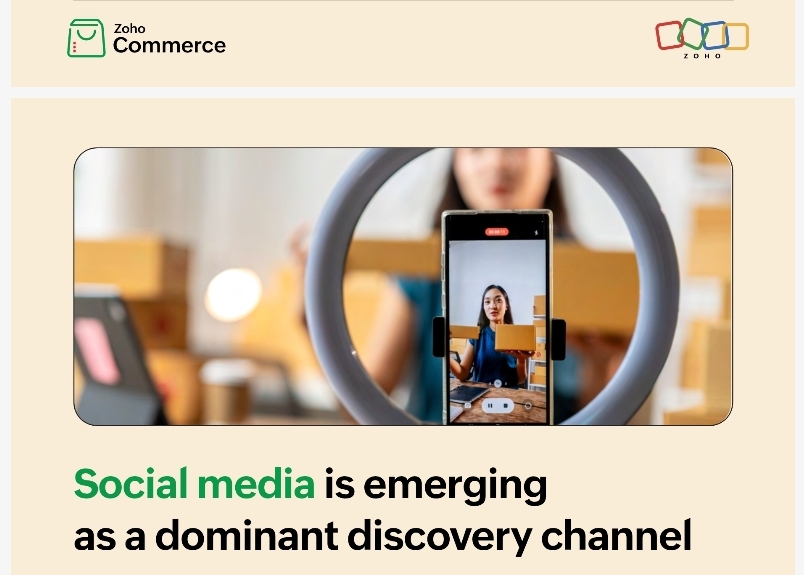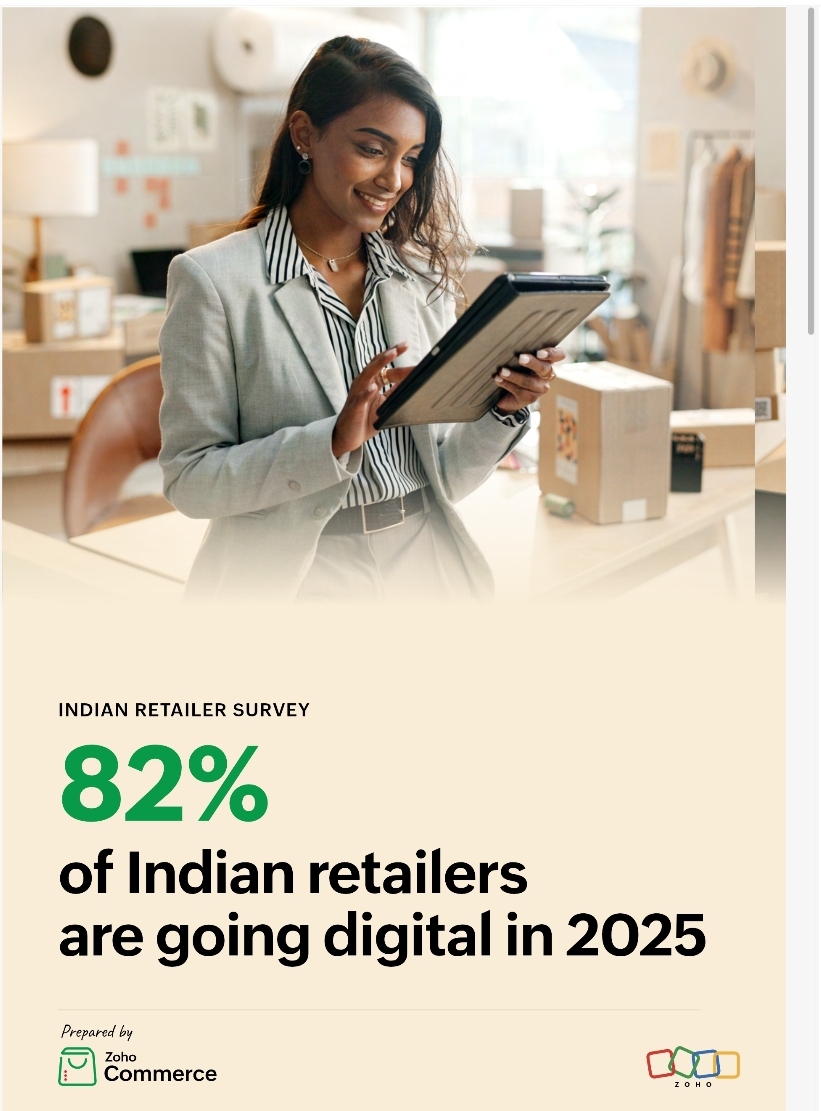India’s retail landscape stands at a transformative crossroads. Furthermore, the country’s micro and small enterprises (Indian MSMEs) are leading this digital revolution. Consequently, Zoho’s latest Indian Retailer Survey reveals striking insights that will reshape how businesses connect with customers.
The AI-Driven Future of Indian Retail
Remarkably, 60% of micro and small retailers plan to invest in AI and machine learning by 2030. Additionally, this investment signals a fundamental shift toward tech-driven customer experiences. Moreover, 44% of retailers believe AI-powered personalisation represents the future of shopping.
Subsequently, this technological adoption will revolutionize how customers interact with brands. Furthermore, personalized experiences will become the new standard across India’s retail sector. Therefore, businesses must prepare for this AI-driven transformation.
Omnichannel Strategy Becomes Essential
Notably, six out of ten Indian MSMEs have adopted omnichannel selling strategies. Similarly, these businesses operate seamlessly across online and offline channels. Additionally, 75% of retailers report that omnichannel approaches expand their customer reach significantly.
Moreover, 68% of retailers generate equal revenue from both retail channels. Consequently, this balanced approach proves essential for sustained growth. Furthermore, the survey shows that integrated selling strategies drive better customer satisfaction.
However, challenges persist in maintaining seamless omnichannel experiences. Specifically, 60% of retail Indian MSMEs face logistics and supply-chain management issues. Additionally, 57% find operational costs high for physical stores.
The Digital Migration Accelerates
Impressively, 82% of offline retailers want to transition to digital platforms. Furthermore, these businesses consider marketplaces the ideal bridge for digital transformation. Consequently, traditional retailers are rapidly embracing online opportunities.
Nevertheless, physical retail experiences still hold significant value. Specifically, 71% of businesses report customers prefer in-person shopping to examine products. Additionally, personalised in-store service attracts 66% of customers to physical locations.
Interestingly, nearly 50% of retail Indian MSMEs prefer starting with pop-up stores. Moreover, these flexible formats offer cost-effective entry points for physical presence. Therefore, pop-up stores become strategic stepping stones for digital-first retailers.

Customer Demands Drive Innovation
Significantly, 57% of retailers identify faster delivery as the most critical customer demand. Furthermore, over half of online retailers see increased interest in same-day delivery. Consequently, speed becomes a competitive differentiator in modern retail.
Meanwhile, convenience motivates 82% of customers to shop online. Additionally, competitive pricing influences 71% of online shopping decisions. Therefore, retailers must balance speed, convenience, and value to succeed.
Technology Transforms In-Store Experiences
Remarkably, nearly 70% of respondents now offer mobile payment options. Furthermore, 66% have adopted tablets for enhanced product browsing experiences. Additionally, 50% use kiosks for instant ordering capabilities.
Moreover, digital reviews are transforming physical store experiences. Similarly, online discounts bridge the gap between digital and physical shopping. Consequently, AI-powered personalisation makes physical stores more interactive and convenient.
Social Media Emerges as Primary Customer Touchpoint
Notably, 72% of businesses use social media as their primary customer touchpoint. Furthermore, this platform outperforms search engines at 67% and marketplaces at 60%. Therefore, social media becomes the new digital storefront for Indian retailers.
Additionally, 61% of digital businesses collect customer feedback through social platforms. Similarly, 30% of offline businesses leverage social media for customer engagement. Consequently, social media serves dual purposes for discovery and relationship building.
Moreover, retailers are increasingly leveraging social media for lead generation. Furthermore, these platforms provide cost-effective marketing opportunities for small businesses. Therefore, social media strategy becomes essential for retail success.
Zoho Commerce Responds to Market Needs
Subsequently, Zoho has enhanced its commerce platform to meet evolving retail demands. Furthermore, the updated platform features over 15 modern online store templates. Additionally, native mobile applications for Android and iOS enable seamless store management.
Moreover, the platform now supports social selling through multiple channels, including WhatsApp. Furthermore, customers can view catalogues, add items to carts, and transition smoothly to online stores. Consequently, this integration creates seamless shopping experiences.
Additionally, Zoho Commerce offers end-to-end order lifecycle management. Furthermore, workflow automation streamlines internal processes for retailers. Therefore, businesses can focus on customer experience rather than operational complexities.
B2B Capabilities Expand Market Reach
Significantly, Zoho Commerce now supports B2B and wholesale selling features. Furthermore, businesses can manage quote requests and price negotiations effectively. Additionally, credit limit management helps control financial risks.
Moreover, these B2B capabilities open new revenue streams for retailers. Furthermore, wholesale functionality enables businesses to serve multiple market segments. Consequently, retailers can diversify their customer base and increase profitability.
Survey Methodology Ensures Reliability
Importantly, the survey gathered responses from over 2,700 Indian MSMEs across India. Furthermore, this comprehensive sample represents varying business sizes and regions. Additionally, Zoho Survey software ensured data accuracy and reliability.
Moreover, the survey methodology provides valuable insights into India’s retail transformation. Furthermore, these findings help businesses understand market trends and customer preferences. Therefore, retailers can make informed decisions about their digital strategies.
Looking Ahead: The Future of Indian Retail
Ultimately, India’s retail sector is undergoing unprecedented transformation. Furthermore, Indian MSMEs are leading this change through strategic technology adoption. Additionally, AI and ML investments will drive future growth and competitiveness.
Moreover, omnichannel strategies will become standard business practices. Furthermore, social media will continue evolving as the primary customer engagement platform. Consequently, retailers must adapt quickly to remain competitive.
Finally, customer experience will determine business success in this new landscape. Furthermore, businesses that embrace technology while maintaining personal connections will thrive. Therefore, the future belongs to retailers who can seamlessly blend digital innovation with human-centered service.
This comprehensive survey demonstrates how Indian MSMEs are reshaping retail through strategic technology adoption. Furthermore, businesses that embrace these trends will position themselves for sustained growth and success in the evolving marketplace.

